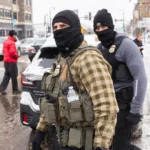
Analysts warn that the truce is asymmetrical: protects civilians, but reduces autonomy of the Syrian state and weakens its sovereignty
Ahmad al-Sharaa’s recent statement, self-proclaimed Syrian president, that Damascus is “afraid of Israel” is more than an admission of vulnerability; It is an alarming symptom of the erosion of the principle of national sovereignty in a Middle East already devastated by conflicts. While a security agreement between Syria and Israel is announced as “99% complete”, it is crucial to critically analyze this process, which, far from representing just peace, seems to consolidate a relationship of domination and capitulation. Defending peace does not mean accepting a nation’s subjugation, and Syria sovereignty should not be negotiated under the constant threat of bombs.
Sharaa, a figure whose trajectory is intrinsically linked to groups such as the Nusra Front (now HTS) and has taken control of the country after a devastating war, says Syria creates problems for Israel. However, this submissive rhetoric – “we are afraid of Israel” – is the antithesis of dignity that a people deserve from its leader, even in contexts of extreme asymmetry of power.
Also read:
Syria admits ‘fear of Israel’
Excess Ia tires teams and delays results
Trump’s change in Ukraine shakes defense actions
Fear is an understandable reaction to a state that, as reported, “has repeatedly bombarded Syria” and maintains a “widespread occupation in the south of the country.” But to transform this fear into a state policy is to normalize the violation of international law.
The gestation agreement, treated as a “security agreement” and not peace of peace by the Syrian authorities themselves, seems to be deeply unbalanced. The information suggests that Israel would commit to interrupting its attacks in exchange for Syria not to move military equipment near the border.
At first glance, a truce. But in practice this consolidates an exclusion zone in the Syrian territory, where Damascus abdicates his sovereign right to defend himself, while Israel is not explicitly responsible for its past and future forays. It is a peace imposed by force, not the result of dialogue between equals.
The Israeli justification for its attacks, such as bombing to the Presidential Palace and the Ministry of Defense in July, was framed as “support for the minority Drusa”. However, this narrative is deeply cynical. Sharaa himself states that Damascor supports Drudos’ rights, while reports accuse his forces of massacred thousands of Drudos civilians.
This chaos is the perfect background for external intervention. Israel poses as a minority protector while its military action further weakens state structures, creating a vacuum of power that benefits its geopolitical interests, specifically to “prevent” Hezbollah or Iran will establish presence in southern Syria.
The involvement of the United States, through the special envoy Tom Barck, which states that “everyone is addressing it in good faith,” solemnly ignores the reality of the land. The Syria of Sharaa is a bankrupt state, controlled by a jihadist faction that, paradoxically, now represses the same factions of Palestinian resistance that once found refuge in Damascus. This is the tragic irony: a government born of war and extremism, now negotiating the surrender of Syria sovereignty with the same Israel with which there was “confirmed coordination” between Tel Aviv and the nusre front in the past. What kind of agreement can arise from such a complex web of contradictory interests and dark alliances?
Sharaa rightly warns that the division of Syria would damage Jordan, Iraq and Turkey, leading the region “back to stake.” However, a security agreement that sacrifices Damascus’s powerlessness to Israeli violations is already a form of division.
It is the institutionalization of a de facto protectorate. Sovereignty is not an abstract concept; It is the right of a people to control their territory, their airspace and their political destiny. When a country is forced to “have no interest in a confrontation” because the price of resistance is annihilation, sovereignty is already dead.
Therefore, it is possible and necessary to oppose war and at the same time defending uncompromisingly the sovereignty of Syria. True peace will not be achieved through asymmetrical agreements negotiated under the target of weapons, but through respect for international law, the termination of foreign occupation and the reconstruction of a truly independent and representative Syria of all its people. Fear is a dangerous counselor.
The submission, a path without return. The international community should require a solution that does not humiliate a nation but guarantee security and justice to all peoples in the region, including the Syrian. Syrian sovereignty should not lower its head; It must be the base on which a lasting peace will be built.
With information from The Cradle*
Source: https://www.ocafezinho.com/2025/09/25/siria-teme-israel-e-ve-sua-soberania-ameacada/

